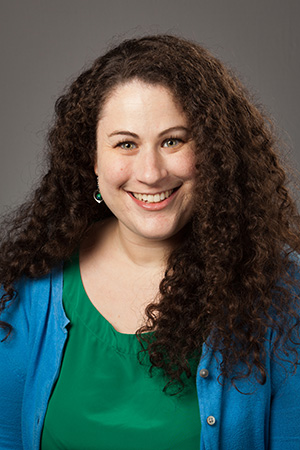Dana Weiser
 What are your current research interests?
What are your current research interests?
My research examines how family experiences and parent communication are associated with young adults' relationship and sexual behaviors, with a specific focus on infidelity and sexual violence. One main area of my work examines how the experience of a parent infidelity is associated with young adults' likelihood of engaging in infidelity themselves. Another central topic in my program of research studies messages parents communicated to their children about consent and sexual violence, and the gendered nature of these messages. I have also written about the myth of false reports, conceptualizations of infidelity, and predictors and responses to infidelity. My work is grounded in a number of theoretical perspectives, most commonly social cognitive theory and feminist theories.
What types of outreach and engagement have you been involved with?
I am one of the co-organizers of the Sexism|Cinema Film Series (along with Drs. Mike Borshuk, Don Lavigne, Jessica Smith, Elizabeth Sharp, and Allison Whitney). We have partnered with the Alamo Drafthouse theater since 2015 (and went virtual during COVID) to screen and discuss films featuring women-identified protagonists. The film series creates space for members of the Lubbock and Texas Tech community to have a critical dialogue about how media endorses, challenges, and reifies insidious narratives about sexism, racism, heteronormativity, cisnormativity, classism, and ableism. I have also delivered several trainings and seminars throughout Texas Tech about Title IX, sexual violence, and sexism within higher education.
Why did you choose this field?
I was a Psychology and Government major in college and found the topics fascinating but I first started as a researcher almost by accident. The job I held throughout college no longer needed me, so I applied to work as a research assistant for the Berger Institute for Work, Family, and Children at Claremont McKenna College the summer before my senior year. Working under the mentorship of Dr. Diane Halpern, I discovered my love of research and better understood the impact and implications of social science research. I was fortunate to write my undergraduate senior thesis with Dr. Heidi Riggio which ultimately became my first publication. The project examined how relationship attitudes interact with family experiences and are associated with relationship outcomes. After my Bachelor's and Master's degrees with Dr. Riggio, I had the incredible experience of working with Dr. Dan Weigel at the University of Nevada. From him I learned so much about the amazing world of family science and relationships research. So beyond studying topics I find impactful and intriguing, I also chose this field because of the amazing mentorship I received.
How do you define good teaching?
Good teaching to me is when the professor works to co-construct a positive learning environment along with the students. I predominantly teach Human Sexuality across the Lifespan, a course that many students are excited about and some have trepidations. Some of the topics are sensitive and I create opportunities for the students to have voice, ask questions, and think critically about our course materials. Importantly, I also set strict expectations for inclusivity, respect, and responsiveness. Moreover, I make a point of assigning journal articles and describing the research underlying phenomenon so students can better understand why we know particular information about sexuality and relationships. It is important to me for students understand the science underlying sexuality and romantic relationships. Students also greatly appreciate an organized teacher!
What is your proudest professional accomplishment?
I am continuously overwhelmed with pride and joy when I see my students reach milestone, present, and publish their work. My life has been indelibly positively changed because of the academic mentorship I received and it is a tremendous source of pride to support and train our next generation of scholars and practitioners.
How do you integrate research and outreach into teaching?
I have a great deal of synergy between my research, teaching, and outreach. Whenever it is relevant, I incorporate my own research in class discussions. We cover infidelity and sexual violence in my classes so it is a natural way to incorporate my work and the students greatly enjoy attending Sexism|Cinema and having the opportunity to apply their accumulated knowledge. I think it is meaningful for the students to know that I am not only sharing information with them but also working to create this knowledge and sharing the implications of my research inside and outside the classroom.
More about Dana Weiser
Dr. Dana Weiser is an associate professor and the interim chairperson for the Department of Human Development & Family Sciences. She is an active faculty affiliate in the Women's and Gender Studies program and a co-founder and co-organizer of the Sexism|Cinema Film Series. She is chair-elect of the Feminism & Family Studies section of the National Council on Family Relations, on the editorial board for the Journal of Social and Personal Relationships, and serves on the Publications and Teaching committees for the International Association for Relationship Research. Dr. Weiser is co-author of the textbook Introduction to Human Development and Family Studies and to date has published over 30 journal articles. She is currently a co-PI for the NSF funded project #Why Not Me? A Holistic, Developmental Response to Promote Diversity in STEM. She earned her Bachelor's degree in Psychology and Government from Claremont McKenna College, her Master's degree in Psychology from California State University, Los Angeles, and her Ph.D. from the Interdisciplinary Social Psychology program at the University of Nevada.
Office of the Provost
-
Address
104 Administration Building, Box 42019, Lubbock, Texas 79409-2019 -
Phone
806.742.2184 -
Email
provost.communications@ttu.edu
